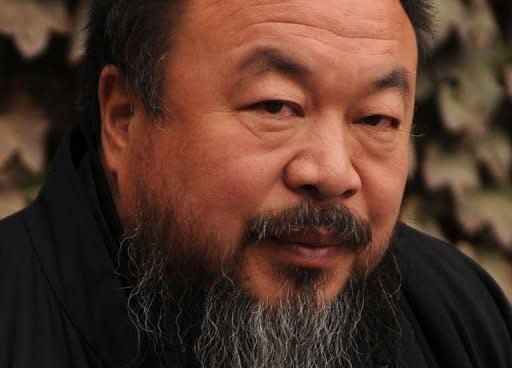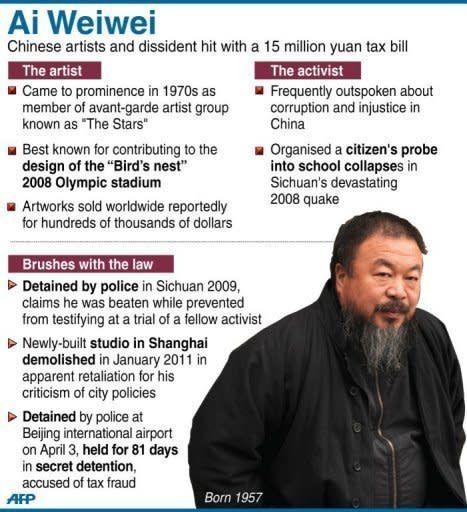Ai Weiwei vows to expose China
Artist and dissident Ai Weiwei said Wednesday he would use his battle with China's tax authorities to expose the regime that detained him, as he prepared to challenge charges of massive tax evasion. Ai, who was held in a secret location for 81 days as part of a widespread crackdown on rights activism in China earlier this year, says the charge is politically motivated and has vowed to challenge it. On Tuesday the 54-year-old, facing a bill for 15 million yuan ($2.4 million) in alleged back taxes, handed 8.45 million yuan in donations from his supporters to the Chinese authorities as a bond to clear the way for an appeal. "We can use this as a chance to make the world understand what kind of system they are working with," Ai said in a telephone interview with AFP as he prepared to challenge the charge, calling it a "real opportunity". "We just paid (over) 8 million only because I want to have freedom of speech," he said, adding that the sums involved were unimportant "compared to the kind of social achievement it will have". Ai said he had signed a contract with tax authorities on Wednesday agreeing that the $1.3 million he and his lawyers handed over on Tuesday -- all donations from his supporters -- would be used as collateral in his case. The money was raised from supporters who came from far and wide to help him raise cash, some even throwing banknotes folded into paper airplanes over the walls of his courtyard home. Total donations had reached 8.69 million yuan ($1.4 million) by Sunday night, when the appeal closed, and Ai said the generosity of the Chinese people had made him realise that he was "not alone" in his struggle. "So far, I am still in very good spirits because all the money has come from donations," Ai told AFP as he headed to the tax office where he and his lawyers will file an appeal in the next 60 days. But he said the situation had taken a toll on his family, including his two-year-old son. When explaining his detention to his son, for instance, his family told the boy that his father "went to England to work". Ai explained that England was familiar to his son as he had once taken him there. "So the first words he told me were 'Daddy, never go to England again'," Ai said. "When he's really angry at somebody he says 'I will send you to England.' He doesn't really understand. He thinks that England is some kind of punishment." Chinese media has devoted little coverage to the case, but on Wednesday a commentary in the state-run Global Times questioned the level of domestic support for Ai, comparing him to the late-1970s activist Wei Jingsheng. Wei, whose ideas predated the Internet, now lives in exile in the United States and is all but forgotten in China, especially among the nation's web-obsessed younger generation. Ai -- an avid user of online social networking tools -- retorted that "at least 95 percent" of the money sent to him was from inside China. Chinese tax authorities have repeatedly refused AFP's requests for comment on Ai's case, which is particularly complicated because the company involved in the tax evasion charge is owned by his wife and not him. The artist bemoaned the tax authorities' lack of transparency and said both the manager and accountant at the company involved in the case -- Beijing Fake Cultural Development -- had disappeared at the hands of the police. "They have to tell us what's going on, because I have no idea," he said. He has said he will pay back his supporters once the case is over, and was initially reluctant to hand over the money raised to Chinese authorities for fear that it would not be returned to him. Ai is known for his often irreverent art and for tallying the children killed in the 2008 Sichuan earthquake, shining an unflattering light on officials who some accused of covering up the role shoddy housing played in the deaths. The value of his sculptures, photographs and installations has shot up since his detention in February catapulted him into the global spotlight, and last month the influential Art Review magazine named him the most powerful figure in the art world. Ai said he currently had little time for his regular art work, but that he considered his fight against the government to be an extension of his artistic endeavours. "I think this is my artwork. My artwork is about communication and expressing my social concern," he said.




